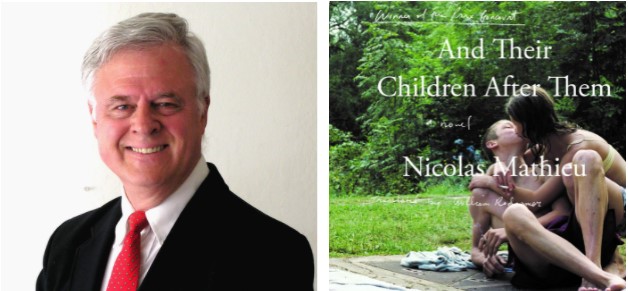William Rodarmor on 2021 Albertine Prize Finalist ‘And Their Children After Them’

William Rodarmor is a veteran French translator and a former fellow at the Banff International Literary Translation Centre. He lives in Berkeley, California, where he teaches at UC Berkeley’s School of Journalism.
Albertine Prize Committee: Why did you choose to translate this book?
William Rodarmor: I had worked with Other Press publisher Judith Gurewich before, and she made me an offer I couldn’t refuse. And Their Children after Them is a gripping novel about a depressed industrial town in northeast France populated with characters I found fascinating. Most of all, I loved the fact that the book is so well written. Translating a big book is like getting married: You’re going to spend a long time together. You may put in months weighing each word, often more carefully than the author. With Children, I was always eager to get to work each day.
A.P.C.: What did you absolutely want to keep and convey in this translation? Were there any specific segments you struggled with, things you were not able to keep in English?
W.R.: For me, the most important thing was accurately catching the book’s tone. Children portrays a gritty world that might remind American readers of rustbelt Michigan or Pennsylvania. Mathieu is an acute observer of people and how they live, work, flirt, and argue. Also how they create a drug empire, smoke hash in Morocco, set fires, and steal motorcycles. (You never know when that knowledge might come in handy.) Some of Mathieu’s set pieces are masterful. At one point, a character is on the verge of shooting a man. In the instant before the trigger can be pulled, Mathieu describes how the bullet might travel out the gun’s muzzle, across a few yards of space in ultra slow motion, into and through the victim’s skull. Like the bullet, the reader hangs in the air, transfixed. Children isn’t all doom and despair, however. Most of the characters are trapped, but a few escape to pursue better lives. And some scenes are very funny. I laughed out loud while translating a scene where two teenage girls discuss the (literal) shortcomings of their faithless shared boyfriend.
A.P.C.: What did you find the most challenging in translating this book?
W.R.: Trying to faithfully reproduce the voices of the characters. Like most translators, I’m a ventriloquist, and I work hard to make people sound like themselves, and not like me. It’s a challenge to get lower-class teen-speak from the 1970s and ‘80’s right in any language. One of Mathieu’s most vivid characters is an immigrant drug dealer in the projects, and it was a stretch to make his thinking and dialog sound true to life on the page. The sex scenes were the toughest to translate. Sex is notoriously hard to write about, and no easier to translate. My prose probably falls somewhere between puritanical and pornographic. Maybe sex is just better in French.
A.P.C.: How was the editing process with the author and publisher?
W.R.: Working on Children for Other Press couldn’t have been easier. Mathieu is a terrific writer, so translating him was a joy. He’s also easygoing and good humored. I peppered the poor man with email queries, and he was endlessly patient in clarifying things I didn’t understand. Other Press is an outstanding publisher, committed to literature in translation and unafraid to support challenging books.
A.P.C.: Do you find important that the translator takes liberties with the text while translating a book? If yes, what kind of liberties?
W.R.: Like it or not, a translator has to take liberties. How many depends on closely the translator hews to the words of the text. I’m on the side of the reader, so I’d never produce a literal, word-for-word translation, however faithful. My goal is always to produce a text so smooth that the reader isn’t aware it’s a translation. It should read like a book that Mathieu would have written if he were more fluent in English. So I occasionally take liberties, especially with jokes, slang, and idioms. But thanks to email, I can run my textual sins by the author before committing them to paper. Even after some forty books and screenplays, I still love doing translations. It has all the pleasures of creative writing, and you never have writer’s block.
And their Children after Them, a novel by Nicolas Mathieu, tr by William Rodarmor, Other Press, published in France by Actes Sud.
Click here to purchase that book with us.
The Albertine Prize, co-presented by Van Cleef & Arpels and the French Embassy, recognizes American readers’ favorite French-language fiction title that has been translated recently into English. Media partner: The New York Review of Books.

